Click on images to enlarge
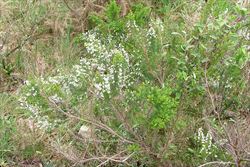
infestation (Photo: Sheldon Navie)

habit (Photo: Sheldon Navie)
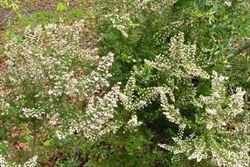
habit (Photo: Sheldon Navie)
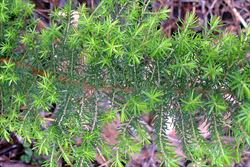
stems and leaves (Photo: Sheldon Navie)
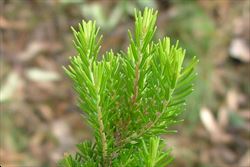
close-up of young leaves (Photo: Sheldon Navie)
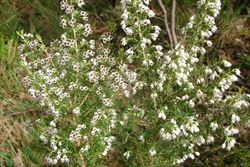
flower clusters (Photo: Sheldon Navie)
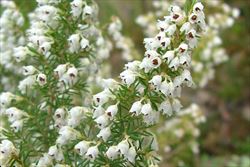
flowers (Photo: Sheldon Navie)

close-up of flowers (Photo: Sheldon Navie)
Scientific Name
Erica arborea L.
Family
Ericaceae
Common Names
briar root, root heather, tree heath, treeheath
Origin
Native to southern Europe (i.e. Albania, Bulgaria, Greece, Italy, Yugoslavia, France, Portugal and Spain), the Madeira Islands, the Canary Islands, northern and eastern Africa (i.e. northern Algeria, Morocco, Tunisia, Ethiopia, Sudan, Kenya, Tanzania, Uganda and Rwanda) and western Asia (i.e. Turkey).
Naturalised Distribution
Naturalised in many parts of south-eastern Australia (i.e. in the central tablelands of New South Wales, in southern Victoria, in Tasmania and in the southern parts of South Australia).
Also naturalised overseas in the UK and New Zealand.
Notes
This garden escape is regarded as an environmental weed in Victoria, Tasmania, New South Wales and South Australia. Tree heath (Erica arborea) is also listed as a priority environmental weed in one Natural Resource Management region and is seen as a potential environmental weed in other parts of southern Australia.
In the greater Adelaide region, in south-eastern South Australia, tree heath (Erica arborea) has been described as both a common environmental weed and an invasive garden plant. It has already invaded numerous conservation areas in this state, including Mount George Conservation Park, Sturt Gorge Recreation Park, Black Hill Conservation Park, Cleland Conservation Park, Montacute Conservation Park, Anstey Hill Recreation Park and Eurilla Conservation Park.
In Victoria, small localised populations are present and it is considered to pose a very serious threat to riparian vegetation over a much larger area. Tree heath (Erica arborea) is also widespread in Tasmania, and is considered to be beyond eradication in this state. In New South Wales it is much less widespread, so far only being recorded in the Blue Mountains region on the Central Tablelands. However, it is reported to be locally common in disturbed eucalypt woodlands in this region, growing amongst shrubs underneath trees.

